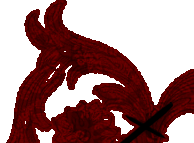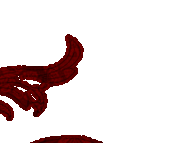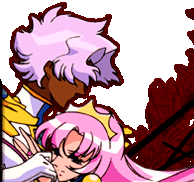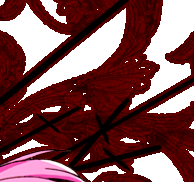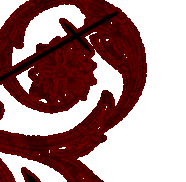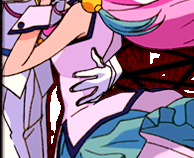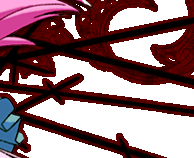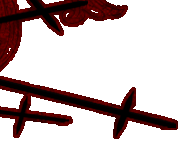
Written by Giovanna, December 2021 
The Creation of Nanami Kiryuu
The birth of Nanami Kiryuu was not planned by Be-Papas. The manga version of Utena, which was produced concurrently with the television series, doesn't include her beyond a photograph, and the movie that followed excludes her with an equally irrelevant cameo. Though she appears in other iterations like the musicals, game, and novels, it's safe to say the manga, series, and movie are our holy trinity, and Nanami is only prominently depicted in one of them.
This prominence is the work of a single screenwriter: Noboru Higa. Rumoured to be Ikuhara himself under a pen-name, Higa reports having instead met Ikuhara at a veterinary hospital. This may or may not be true. What we do know is that Noboru Higa is a pseudonym used only for the production of Utena1 by writer Ryota Yamaguchi, whose credits include Sailor Moon Stars and Vision of Escaflowne. This seems less surprising than it might have been given his strange engagement with the material:
Normally for a TV anime, the director or the series structure man will establish a fundamental baseline, and they’ll have the rest of the writers follow along that line. However for Mr. Higa’s work on Utena, we’d ask him to write in a way that was completely different conceptually from the line taken in Enokido scripts and the like. We placed unreasonable script orders like “Do something that will throw off the people watching on TV and make them go ‘Whaaat? Did they just do that?!?’”
- Yoji Enokido, Japanese laserdisc notes as translated by Nozomi for the US release bonus materials
So what scripts did they order from this screenwriter, then? Noboru Higa wrote Nanami episodes. Only Nanami episodes. ALL the Nanami episodes. He is not, however, a member of Be-Papas, and Nanami was not part of the original conception of Ohtori Academy and what would happen within it. She’s given a unique place within the story, both part of it and not, and though she seems meant to help explore and illustrate the central themes of Utena, she ends up having a mind of her own, and in a very real sense, deviates from the script.
1. According to his Wiki, Utena is not only the only place he uses this pseudonym, he uses a pseudonym at all only one other time in his long career, right at the start. This speaks even more to the unique and deliberate remove he had to the production, and that it's very much unique in his body of work, though we are left to guess at why.

Though iconic now, the Shadow Play Girls (or SPGs) were originally only intended for scenes in the first episode. The animation staff loved depicting them, so they were repeatedly worked into the scripts, becoming an in-universe way to view themes from new angles or provide context. It’s hard to say what Utena would have been without them. The Shadow Play Girls are a true Greek Chorus, speaking from a uniquely informed vantage point that the other characters, because they are part of the story, simply cannot have.
Like with Nanami, they ended up having minds of their own. They are aliens, they are drama nerds, and they are asking Ends of the World questions he does not want to answer.
Akio Ohtori is, among other things, a stand in for the creative team. He’s the director. He literally gives the characters ‘scripts.’ He conveys to them in letters the sequence and timing of their duels. The show then plays out these scripts, never quite addressing the contradiction: duels that look self-motivated by the miseries of adolescence are also timed by a shadowy figure in the background. He even ‘controls’ events using a planetarium projector that Utena, in one of the weirder lines in the series, confuses with him. The show puts him behind a camera multiple times to stress this point.

The Shadow Play Girls crash a UFO into his tower and read Akio’s finely laid scripts for absolute filth, at times seeming almost mocking of the material they’re inspired by. After all, they often summarize a full episode in seconds. In exchange, Akio does seem genuinely hostile toward them, hanging up on them in episode 33 and referring to them as ‘sophomoric’ in episode 34. The Shadow Play Girls function as a Greek chorus in a world where there wasn’t supposed to be one. They offer perspective. They offer insight. And Akio doesn’t want to hear it.
Why did I just go off about Akio having a predictable hostility towards insight inflicted from outside his world? Because Nanami is like the Shadow Play Girls. Nanami Kiryuu crashes into Ohtori Academy from outside. She’s her own protagonist, with her own script. It’s a childish, dare I say it, sophomoric script, but it’s honest, earnest, innocent… and Anthy doesn’t want to hear it.

Nanami is the hero of her own story, and in that story, Anthy is unambiguously The Enemy. Sometimes Nanami is aware of this: Anthy has her brother’s attention and must pay, or Anthy is a terrifying cryptid looming over her with a hacksaw. Sometimes we are privy to Anthy’s villainy but Nanami is not: Anthy sends her a cowbell ‘by accident,’ or Anthy’s pet laid an egg in Nanami’s bed for some reason. Finally, at the climax of Nanami’s story, we see the same naked malice she does, spread across the couch that hours before, siblings affectionately shared shaved ice on. Nanami’s first act in the series is to attempt to literally expose Anthy, as if a melting dress could somehow reveal her for what Nanami senses she is. Anthy’s killing blow in Nanami’s story is to be exposed, her dress seeming to almost melt off in the same way. Nanami wanted to see it all, and when she did, it left her exposed and alone on the elevator floor.

Nanami zeroes in on Anthy with an almost laser precision that makes so much sense from outside that we don’t really think much about it. Nanami is introduced and framed as the typical school socialite antagonist to Anthy’s demure disengagement. She wants to ruin Anthy’s life because she has (probably accurately) deduced that without Anthy, Touga would pay more attention to her. She knows nothing about why Anthy is around Touga. She knows nothing about who or what Anthy is. She doesn’t quite care how Touga feels about it either, presuming that deep down, they both agree that she should be the priority in their lives. She spends the early episodes of the series flailing wildly and impotently at Anthy with melting dresses, spicy curry, snails... anything she thinks might penetrate the obfuscating wall around this woman, behind which is definitely, she’s very sure, something she needs to know.
In this, Nanami acts as the audience from within the story. Anthy is a mystery in the first arc: we’re told she is a brainless doll, a harmless romantic object, a power source vaguely defined, or a totally normal schoolgirl. None of these feels quite right. They’re leads we know won’t go anywhere. We know it’s the first arc after all. We know that she’s pictured prominently alongside Utena in the opening, and in the closing. We know she’s important somehow, but we don’t know why, and our only option to find out is to just keep watching. Nanami might be working with less information than we are, but from within the story, she has options we don’t.
Nanami is very much a child even within a story set in a school, and especially early on, she tests her theories about Anthy in juvenile ways. Her attacks seem aimed at humiliating Anthy in public spaces, with nudity, or appearing to be weird, or whatever was supposed to happen with the curry. Nanami has a child’s understanding of the violence that the judgement of others can create, but she knows it’s effective and worth weaponizing the cruel whims of the crowd. This is a theme Ikuhara explores a lot in his work, both knowing the strength of standing up to the crowd, and exploring the consequences once you stick out too much. This begs a question: Nanami wants Anthy humiliated in public… but does she have any real understanding of what that entails? What happens next? Does Nanami know anything at all about being truly ostracized? She’s one individual seeking to do harm, but has she considered what happens if everyone agrees with her?
Probably not. Nanami is, by all accounts, deeply spoiled and entitled and free of misery. As far as she’s concerned, she's socially bulletproof thanks to being Touga’s little sister. She's also someone who has been protected from the cruelties of the world she lives in.2 Fair enough. Spoiled rich kid with no reason to be cautious with the weapons she’s swinging.
But if she’s just acting on suspicions the audience has, where do we stand? We’re right there with her, poking and prodding and waiting for bad things to happen, because we also know we’re not going to find out what Anthy’s story is without her and maybe a few others bleeding for it. We need to know. What do we need to know? Who knows. But it’s there, somewhere, and we will keep watching until we find it. And the worse it is, the more satisfied we will be. Why is that?
2. Enokido has stated that Touga, even in the series, was being sexually abused by his father, a process he ‘encouraged’ with the apparently successful hope of protecting Nanami from the same abuse. He further explains that this would have left some resentment of Nanami, as if Touga is wounded most by the degree of his success protecting her. I get into this more later.

It’s all fun and games at first. It’s snakes and snails and spices. We live vicariously through Nanami’s attempts to make Anthy make sense. We’re excited when she hides live animals in Anthy’s drawers. We’re curious what the curry will do. We’re waiting to see what, if anything, will get a rise out of this strange girl. While Utena is our central character, she’s not especially curious about the dueling game, Anthy, or the consequences of anything happening around her. It’s not her fault exactly, she’s just a pink brick. It’s through Nanami that we test this reality we’re shown, and we wholeheartedly consent to and participate in Nanami’s antics, even when it’s illustrated how cruel they can be. Nanami kills a cat, but by the time this happens, we’ve enthusiastically become part of the violence her curiosity can cause.
We know how this ends. We might have laughed with or even at Nanami in the first arc, but we were also stuck in that lonely elevator with her. Did we really want to know? Did she?
Her elevator ride after she sees Akio and Anthy together is… a lot. She’s on the floor, in shock, with her breathing labored… and after a few long seconds, her face turns up toward… what? There’s no one in the elevator but her. Unless you count us. It’s hard to say whether she’s looking at us, or just staring blankly into a space the camera happens to invisibly occupy… but I would argue that’s a distinction without a difference. Nanami is looking for why, and whether she has broken the fourth wall consciously or not, she is in fact looking in the right direction. We are why.
This might feel like a reach, but keep in mind what’s to follow. Nanami’s episodes close out the Akio Arc, and what follows is one of the most violent abuses of audience consent I’ve ever seen. It feels distinctly uncomfortable when Nanami looks up because the camera has afforded us privacy. Shortly after this, in episode 33, we will spend what feels like hours of misery being noticed behind the camera. We, the audience, will consent to watch a truly horrifying abuse take place, and we will do it from the vantage point of the abuser. Haven’t we been that all along? Aren’t we all here because we want to see this? Nanami’s helpless questioning stare in the elevator? That was just training wheels for the moment when Utena would look us in the face, at our worst, and ask us what would make this worth it.

So fine. Nanami is a literal baby child, swinging her arms trying to feel out a space too big for her. Haven’t we all been there? Didn’t we all ask questions we didn’t know how to frame for problems we sensed that we couldn’t even describe yet? Growing up is messy and awkward, even outside of Ohtori. We can make excuses for Nanami, despite the harm she’s done. At this point fans even love her for it. What about Anthy, though?
It’s clear, even through the obfuscation of Anthy’s demure passivity, that Anthy doesn’t like Nanami. Her dislike is palpable, and yet I’ve struggled to nail it down as succinctly as I can nail down Akio disliking the Shadow Play Girls, though that’s worked from less evidence. Anthy’s sneaky like that. Anthy is a queen of passive aggression, micro aggression, and basically any kind of aggression that isn’t a physical assault. (That remains the prince’s specialty.) It’s not that Anthy does anything when Nanami is trying to ruin her reputation with animals. It’s that the consequences keep being ones Anthy obviously knew were coming, and did nothing to save Nanami from. It’s not that Anthy does anything about the exploding curry. She just neglects to provide context before Nanami flies to India and almost dies repeatedly for a curry that is meaningless. It’s not that she sent a cowbell to Nanami knowing Nanami would die on literally any fashion hill… it’s just that her pet cow is also named Nanami!!! Okay well, Nanami isn’t an uncommon name and all… but we know. Don’t we know? We know.
This is deeply, uncomfortably true to life. Passive aggression is hard to fight because it’s about patterns of behavior more often than it is about single acts. Almost everything Anthy does to be mean to someone in isolation can be explained some other way. The benefit of the doubt is always lurking nearby. Nanami doesn’t take this bait, and rarely do the fans, though we’re given more clues to lead us to refuse it. She smiles when she shouldn’t. Her expression is obscured behind glasses when we are suspicious of it. Anthy has learned to wield a kind of power children cannot understand, but are often deeply wounded by.
Nanami would probably struggle to pinpoint how Anthy is being a bitch. But Akio wouldn’t, and Anthy’s interactions with Akio are one way we come to understand more vague moments in the first arc as the hostilities they always were. Anthy answers “Were you lonely this week?” with “chuu-chuu” at one point. This is an onomatopoeia for kissing in Japanese, but it’s also uttered with such an audible eyeroll that you can almost hear Akio’s erection fall through the floor of the 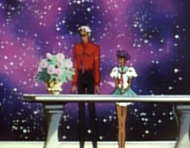 planetarium. In case you don’t hear the eyeroll the first time, she will later make the same sound while staring right at him, after Utena, in a high-pitched awkward burst exclaims, “Wow, being able to go on a date with a cool guy like you is every girl's dream!” planetarium. In case you don’t hear the eyeroll the first time, she will later make the same sound while staring right at him, after Utena, in a high-pitched awkward burst exclaims, “Wow, being able to go on a date with a cool guy like you is every girl's dream!”
There are other more obvious moments of course, ones Akio even stoops to pointing out to her. (“Why must you still torment me?”) This bit I am sticking with though, because this is what separates Nanami and Anthy, and this is why Anthy hates her right back.

Episode 10, “Nanami’s Precious Thing,” is one you’ll see more of than you might realize. Nanami’s childhood experience of bringing a stray cat to Touga’s birthday party is one of the more vividly depicted flashbacks in the series, and how it looks and feels is important. There’s a kind of visual flavor and variety to remembered scenes in Utena. Miki recalls sepia-toned photographs, as if he thinks his childhood belongs left on paper, tucked into the pages of his music. The scenes depicted in his flashbacks are washed in single-hued images, pinks and greens and blues, with their faces, even his own, in shadow. Juri’s flashback starts monotone, faceless, but quickly gains both color and expression. Dialogue doesn’t really seem necessary to explain the scene, and Juri’s memory focused on nonverbal communication.
Nanami’s flashback is depicted with detail and context, and is a story of its own, with its own arc in the episode. It’s a protagonist’s flashback, the colors desaturated but selectively, as if her memory can’t be assed anymore to color in the details that weren’t significant. There are ‘parents,’ but their clothing is muted beyond even the chair Touga sits in.
In this scene, Nanami will try, at great potential harm to herself, to make Touga happy. This is not something anyone else appears interested in doing: there are no children other than them, Touga is isolated on a throne apart from the group, and everything about the scene screams adult socialite affair, not child’s party. In fact, she’s punished for getting filthy, her parents trying to rip the kitten away and remove their embarrassing child from the room. Touga becomes her prince in that moment. How the crowd feels and what it wants fades into irrelevance as Touga stands up, interrupting her exit. A candle flickers, and with a kiss, he tells her that she is the important one. That she has it right. And no one else does.
Two different storyboarders will return to this protagonist’s flashback what feels like centuries later in the series, when it’s time to tell two other protagonists’ stories. The first from episode 30, “The Barefoot Girl,” and the second from episode 34, “The Rose Seal.”
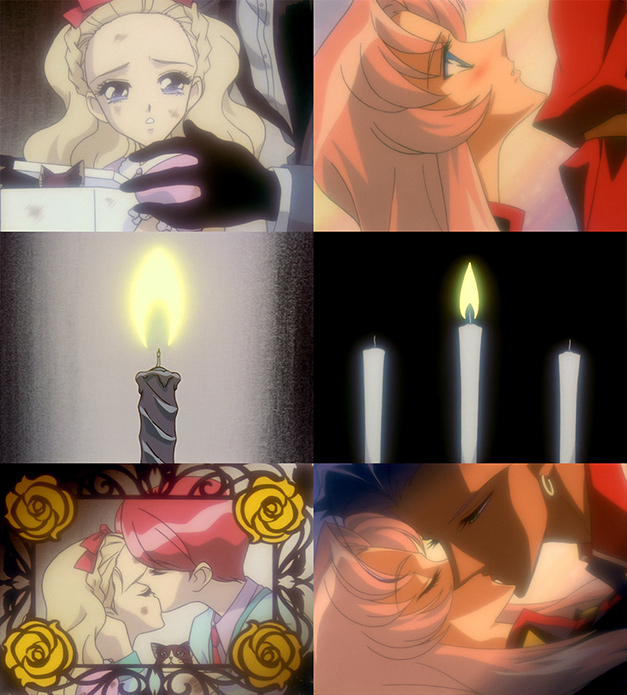
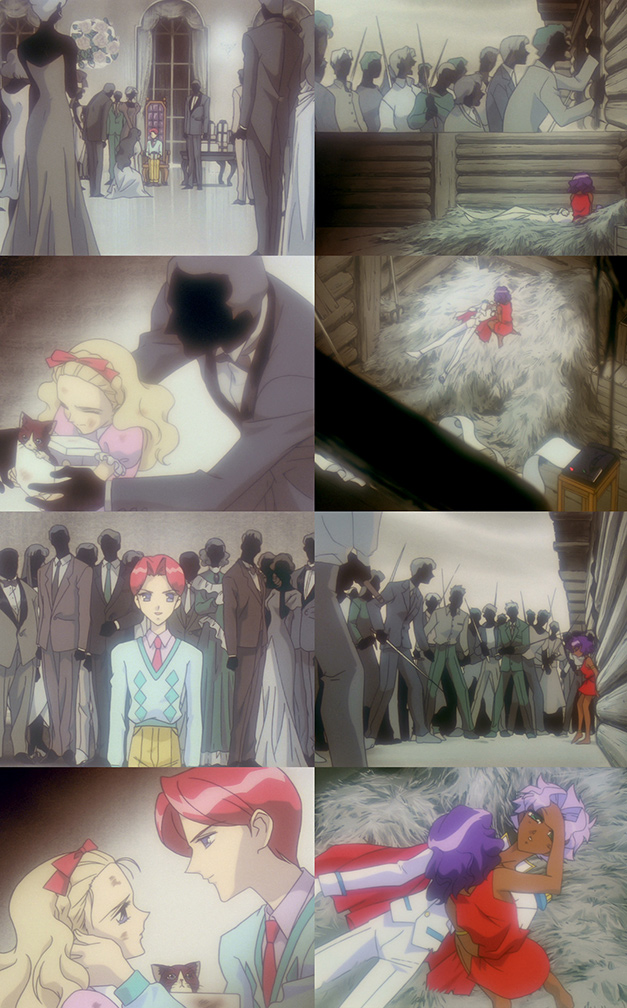
Nanami’s scenes came first because Nanami’s arc is a microcosm of Utena and Anthy’s, a version of it told in advance through an even more childlike lens, by an individual kept apart from Enokido’s larger involvement in the story. The parallels to Utena’s scene with Akio aren’t going to be my focus here, but are relevant for some obvious reasons: the visual callbacks to the candle blowing out, and the fact that they have in common an emotionally devastating moment of validation after feeling rejected in some way. “You’re not like other girls,” is a wonderful, terrifying thing to hear. Touga might have meant well of course, but Akio did not. Nanami and Utena have their worlds rocked either way. I included it mostly to establish the pattern: Utena, Anthy, and Nanami share a visual landscape around their stories that can be read as a kind of ‘protagonist lens’ that will, among other things, be used to hide their antagonists in plain sight, and make us understand why it’s so hard to leave stories that start out so, so well.

Akio thinks everything sucks, the world is inherently a bad place, and that anything of value you must get with blood on your hands. Being earnest and meaning well is for foolish mortal babies, and it gets you killed. He will remind countless duelists of this, through countless cycles of violence, each perpetuated by him for his own reasons. Akio is Nestle telling consumers to turn off the tap while they brush their teeth. If he were simply a hypocrite though, I wouldn’t be bringing him up again.
Akio (again, a surrogate for the creative team) keeps recreating the circumstances of his own miserable past: he keeps elevating strong, noble, eager youths brimming with potential to a force that will always, always be too much for them to withstand. They will give up, they will die, over and over, and by the climax we are shown, there’s a palpable sense that for Akio the attempt to succeed is far less important than the demonstration that failure is an inevitability. He couldn’t save Anthy and he doesn’t think anyone else can either. Demonstrating this to Anthy and demonstrating it to himself is killing two birds with one intensely demotivating stone. The cynicism and self-hatred that permeate the way he tries to create his prince, and the violence with which he responds to his own success, is a literal self-fulfilling prophecy.
Ikuhara explicitly described Akio and Utena as two sides of himself. Two arguments within… and one will sexually assault the other before the end of the story. It’s not hard to see this as an illustration of self-hatred and the damage it can cause. The warped lens necessary to see children existing and growing as indictments of you simply because they’re trying what you failed is even represented in the story: Akio has his planetarium projector, and Anthy has her glasses. The world they see through these lenses is built from the ground up to reinforce the validity of their own miserable outcome. Everyone fails. Every time. Why does everyone fail? Because they’ve been set up to fail. Why were they set up to fail? To prove they always will. Why do they need to fail? Because that’s how the world works.
Akio is the antagonist of Utena’s story, and Anthy is the antagonist of Nanami’s. Anthy responds to Nanami’s blind eagerness to be with her brother with hostility and contempt, because Anthy recognizes the patterns, and is no happier with the outcome than Akio has been. It may be lower stakes, but it’s the same story: Nanami would do anything to give her brother what she thinks he needs. She’ll crawl through gutters to get a kitten she knows he will like, and doesn't give a damn what her parents have to say about it. She will also kill that kitten if she thinks it’s become a threat to the relationship it was always merely a token of. I regret to tell you that in this (in my opinion) well-demonstrated comparison… Utena is the kitten. (But that’s another essay.)
Anthy sees in Nanami a mirror less warped than she would like. A precocious, insightful child: the sort that figures out how to fire the gun, but cannot possibly understand the ramifications of aiming it. Did Anthy understand what would happen when Dios was sealed away? On some level, I think she did; she addresses the crowd with a hostility that expects retaliation, but I don’t think she was able to rationally understand or prepare for the retaliation coming. She chose her path without being able to know the whole of the world. That’s persistence. That’s sincerity. And as Akio was quick to remind himself and anyone listening by then, “that’s not enough to change the world.”
Anthy will never give this speech. It’s not her style. But she too knows something about persistence and sincerity that Nanami does not. She knows it’s not going to be enough to change Touga. She knows, literally in her bones, the price of trying. And Anthy, like Akio, will be unable to stay an objective bystander in the retelling of her life.

The confusion growing up creates is a theme that dominates Nanami’s episodes. The cowbell is every tween picture you as an adult dread running into again. That awkward moment when you attempt to be cool and stand out and instead make a total ass out of yourself. (Why yes, I had a chain wallet and JNCO jeans.) The egg episode is a pretty obvious metaphor for menstruation. That Anthy appears as a kind of villain in these episodes especially gives her an air of toxic femininity: Nanami would fashion faceplant without a cowbell arriving at her door, and she would certainly get her period regardless of any eggs Chu-chu needs to hatch out of. Anthy nevertheless feels compelled to aggravate the situation, to give Nanami a higher cliff to fall off. She’s punishing Nanami for an unavoidable process almost universal to the experience of becoming a woman. It’s a kind of mockery born from a deep self-hatred she shares with her brother: ‘My childhood sucked. My puberty sucked. Everything sucked. I was just like you. I could probably make it easier for you, but that would not change how it went for me, and for that, I hate you, and I hope you do worse.’
So now we get to this mess. Any typical kid Nanami’s age will grapple with the confusion that comes when you learn how varied and complicated the kinds of intimacy that exist are. In a healthy setting, a child would also be interacting with many people, some their age and some not, to develop this knowledge and test it. There would be reasonable guidance by authority figures to redirect toxic or dangerous behaviors. There would be a healthy social structure existing to thrive for its own sake, and you would be cradled in all that good intent. You would be gently redirected when you mistake kinds of intimacy.
I am not about to back up Freud, but I do want to briefly point out that the discovery of sex and sexuality is absolutely a process that begins very early. It is not that unusual to hear about exploring games, or things like girls saying they’re ‘in love’ with male relatives. There’s danger in pathologizing a normal human process, mistaking it for abuses that can easily take advantage of that vagueness. Nanami and Anthy are absolutely not the first baby little kids to think their older sibling is the center of the universe. They’re not the first to have a lot of trouble with that when puberty hits. The vast majority of these awkward processes will resolve themselves in a healthy way given a healthy environment.
Nanami and Anthy have a lot more in common than their brothers when it comes to how and why this all goes south for them. For one, they’re both isolated in a way that implies they’ve been othered and ostracized by adults around them. Anthy appears with Dios in a barn, dressed in a plain red dress contrasted to his uniform. Until she takes what others want (Dios’ attention), no one seems to pay her any mind. Touga’s party goes on with no one questioning where his kid sister is, though clearly she’s been missing for some time. When she appears, she’s treated as well as the kitten she brings. I mentioned earlier that Enokido has discussed this backstory in some length, specifically in the “Enokido Privacy Files” written around the film. I rarely rely on meta or commentary but it’s worth pointing out that according to Enokido, movie Touga’s backstory was canon to the series and then some. To be brief: Touga and Nanami were happy siblings with a friend in Saionji, and then Touga was told to grow out his hair. He was sold to the Kiryuus with Nanami, and when it became clear why, he leaned into it, appearing to enjoy his abuses in a grandiose attempt to draw fire away from Nanami, and convince himself he was okay with the resulting outcome. Nanami and Saionji know none of this. But it does imply some truly terrifying things, not just about that party, but about why Nanami was isolated: she was being protected from worse by a prince who cannot help but turn on her the longer he succeeds. This isolation created a dependency made out of necessity in a space where there was no one to teach them wisdom.
There is a sad desperation in these moments that Anthy and Nanami come to know far too well. It’s a princely impulse, to live to help another. It’s a good thing, isn’t it? We have no else, after all.
The results speak for themselves. Touga and Dios were princes, surely by that definition anyway, but they were children also, and shouldn’t be having to protect anybody. Certainly not with their own bodies, and certainly not from things they had no way of understanding or consenting to. Touga we know was abused, but it’s hard not to read that implication into Anthy and Dios’ backstory, too. Dios, a child, is called on not just to fight dragons, but to also make sure a princess isn’t lonely on Christmas Eve.3 The imagery around the entire event is also deeply difficult to read with innocence, though I hesitate to assert it indicates sexual assault. It certainly suggests it, with open jackets, Anthy’s baggy dress, obvious phallic violence metaphors in the swords, and this bizarre shot:
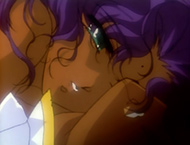
Even without the confirmation of sexual abuse, Dios is working himself to death before puberty while they live in a barn. The only evidence of even electricity is a fax machine running nonstop, making demands. For her part, Anthy appears to be either neglected or may have been abused outright, but either way the stage is set.
Anthy and Nanami do not cling to their brothers out of nowhere, and having had no one else doesn’t mean what they developed on their own, as misled and toxic as it became, wasn’t done with good intention. As each states, they wanted to live to help one another, and they did. They found guns and fired however made sense to them, and it’s hard to place quite as much blame on anyone involved once you realize how little of the moral context you and I enjoy was ever made available to any of these poor kids.
Parents often say things like ‘I want to raise my kids better than I was raised myself,’ and that hope that each generation will learn and grow and advance from where you stood is a good and positive thing. However, it can be hard to be unreservedly happy for the next generation through the fog of deep pain felt by seeing what you needed so so much, far too late, going to someone else. In the only other work I feel compelled to bring up, Peter Beagle’s The Last Unicorn, an adult character named Molly encounters a mythic unicorn, an embodiment of all the potential of youth:
Molly pushed him aside and went up to the unicorn, scolding her as though she were a strayed milk cow. "Where have you been?" Before the whiteness and the shining horn, Molly shrank to a shrilling beetle, but this time it was the unicorn's old dark eyes that looked down.
"I am here now," she said at last.
Molly laughed with her lips flat. "And what good is it to me that you're here now? Where were you twenty years ago, ten years ago? How dare you, how dare you come to me now, when I am this?" With a flap of her hand she summed herself up: barren face, desert eyes, and yellowing heart. "I wish you had never come. Why did you come now?" The tears began to slide down the sides of her nose.
Watching Nanami, with her protected and precious potential, make all the same terrible decisions she did? The bitterness of relating so much a girl who squanders favors Anthy could only have dreamed of? That they are otherwise so different, an extrovert and an introvert, a blunt fool and a woman whose favorite jokes are never shared…does that sting more or less? Is it better or worse for Nanami to thrive?
3. The final episode of Utena aired on Christmas Eve in 1997, lol, so the Prince ended up lonely instead.

The climax of Nanami’s story, the end of her protagonist’s journey, also marks the end of the Akio Arc. She’s the last stop on a ride that goes off the rails shortly after. By this point, the subtle coincidences that hide Anthy's intent melt away. At first, it’s just Anthy’s banana peel that causes Nanami to go sailing right into Akio’s arms. (Banana peels, rose deliveries…) Then in Akio’s office after, Anthy treats everyone to shaved ice color-coded with the student council, literally spoon-feeding Akio the blue one and affectionately giggling about the color of his tongue after. (Later, Nanami will refuse to let Miki take her place, thinking “They would eat him alive.”)

This moment is deeply bizarre, it looks designed to seem innocent outside of the context we have, and yet it even fails there, with Anthy’s eyes narrowed in enjoyment as she feeds Akio. Nanami is far better at reading this room than Utena, who looks on in oblivious approval. Arguably, what Nanami is picking up on is the suspicious enjoyment on display; Anthy doesn't act this way ever. Why is she acting this way? What is happening? They’re taunting her, knowing why she is there, knowing what is going on with her brother, and knowing that Nanami will both notice something off that Utena doesn’t, and be unable to quite pin it down. She seems to register their behavior less as appropriate sibling interaction and more like flirting. Which makes sense, Touga has been baiting her with vaguely sexual advances this whole time and the little smiles and glances feel familiar.
Akio and Anthy are clearly putting on a show for her, but their enjoyment does seem genuine, and Anthy knows very well what’s up: she throws the game of rock-paper-scissors to sleep upstairs with Akio later, her hand visibly extending last and her reaction to losing being extremely uh, Anthy-like.

The scene Nanami walks in on is deliberately erotic, shocking even. A lot of skin and suspicious framing indicate how recently Akio and Anthy finished: Anthy’s leg hangs off the couch, a shoe flung nearby. Akio sitting with his shirt wide open, but his face out of frame. Anthy’s got the Rose Bride dress specifically, a choice I always felt appropriate here and never really considered why until now: this is her villain moment. This is Anthy doing the one thing she is most empowered to do to most viciously demolish Nanami’s state of mind, and she’s leaning into that hard. Akio’s the first thing she sees, and Nanami in her ignorance is initially happy to see him, but it’s Anthy she keeps thinking about in the elevator. Anthy’s skin, Anthy’s hair, Anthy’s supine body. There are absolutely sapphic readings to be made here should you be so inclined, but for my part, these images plague Nanami not because of attraction, but because of confused and terrified envy.
Anthy has known the trajectory Nanami is on this whole time. She knows the question Nanami hasn’t learned the vocabulary to ask. Nanami’s reaction is one that I think encourages a lot of interpretation. Is she just disgusted and in shock? Is she scared and excited? Was it the attraction to Anthy or envy for her position relative to her treasured sibling?
I don’t think Nanami wants to have sex with her brother at all, at any point. Nanami wants to drive away all the sexual pests around him: his interest in them will disappear once they're out of sight, returning him to his natural state as Her Brother. By this point, that deeply unconsidered but strongly held belief has been destroyed, and at her most hopeless and lost, Anthy offers her a solution she hadn't considered. Nanami knows, even now I think, that it’s a poisoned chalice. It’s not what she wants. It won’t fix things. It’s why she doesn’t even hesitate when Touga makes an advance in the car. She knows better. She doesn’t want that jam, even if Anthy says it’s tasty.
Nanami also knows she would have been infinitely happier having never been shown this option. In a rare moment of actionable insight at Ohtori, she chooses to try to leave the school. She doesn’t even announce this, but simply files the request. Nanami hasn’t seen it all, but she’s seen enough to know there is no good apple in a spoiled lot. With her connection to Touga no longer binding, she tries to leave and find an identity apart from him, and all of this. As she waits, she shrinks under Anthy’s hacksaw, and they share a moment of open recognition. “She’s too scary,” says Nanami, knowingly in earshot of Anthy.
“Who me? Don’t mention it.”
Later that night, it’s not Nanami who picks up the phone that has tormented her this whole time. It’s Chu-chu… meaning it really might as well be Anthy leading her back to Touga again. With the likes of Touga, Anthy, and Akio conspiring to drag her back into the muck, Nanami is outgunned. Her duel happens in a rage, and even she can’t quite articulate why she’s there, except that she wants to “surpass everything.” Utena, her brother, herself until now…
Saionji begins this arc similarly, asserting that he will no longer duel, only for Touga to ‘help’ change his mind. In his fight, he goes on about having seen “the world.” Saionji and Nanami I think struggle here to articulate the same realization: the system they are in is fundamentally corrupt and will not permit them to be their own protagonists. It wasn't made for them, and it will not help them.
Nanami wants to surpass everything. And by everything, isn’t she really just saying ‘the script?’

We find out over the course of the show that Tsuwabuki has been trying to kill Nanami so that he can set up the circumstances to save her. This is framed as childish and adorable if a bit horrifying, though it is also exactly what Touga does in episode 10, thus confirming Tsuwabuki has already succeeded in becoming like him. His is just the most juvenile of the many elaborate attempts by characters to recreate the world with themselves as the protagonist. It’s human nature to do this, but it’s also easy to get carried away into other peoples’ stories, and whose stories get to play out the way they want isn’t about how much they try, or how much they care. It's about how much the people watching them want their outcome to happen. Being the protagonist is all well and good, but in doing so, you give up the power to tell the story, and it becomes up to the audience to decide whether it was ever a good idea.
Utena and Anthy change each other’s lives by demonstrating that it’s not worth it to be a protagonist, a prince, or a witch. Being what others expect of you will only ever let you relive their pains and miseries. Aiming instead to be like them is a different path to the same unhappy destination. Even when it feels right and seems like wisdom, striving to be a protagonist puts your defining attributes in someone else's hands. “Remain strong and noble,” says the worst person you know.
We love Nanami because she ‘says it like it is’ in a series where no one does, but we also enjoy watching the myriad ways Anthy hides what ‘it’ is. Nanami depicts the blind and desperate grasping we all felt as children, trying to make sense of a world that isn’t playing by the reasonable and good rules we’d made for it already in our heads, in our colorful notebooks. Most of us find Anthy compelling whether we relate to her or not, but for me, by now, her bitterness also makes sense. It hurts in a deep and inescapable way to watch younger people make mistakes you did. You want them to do better in one sense, but in another, you don’t have to envy them for reaching the horizon if they never get there. The thing is, resenting others for their own journeys is just another kind of dodging the writing of your own story, and being the antagonist is no more empowering in the end than being the protagonist.
Nanami is the first one out of the duelists’ uniform. By the final duel, she’s long since discarded her rose crest. Her script is done with her by then, and the feeling is mutual; the heroine’s journey laid out by Noboru Higa concludes several episodes before we reach Utena and Anthy’s end. One of Nanami’s final acts is to crash into Enokido’s script, into an emotionally intricate web of badminton, queerness, and character conclusions, to remind everyone that they’ve been absolute idiots for falling for all of this. Utena she targets specifically, telling her to avoid Akio and Anthy. Utena seems amused, but thanks her for the warning. Nanami sees that Utena will be unconvinced, and immediately cedes the territory. They are often presented at odds, but I like to think they finally understand each other. They’re fools of different kinds, fighting against the scripts given to them. Nanami can alert Utena to all the hazards she likes, but spoiling Utena’s script for her doesn’t change Utena’s need to rebel against it in her own way.
As for Anthy? Her script is endless, a plodding and repetitive slog whose best moments seem like threads of a plot long since unravelled. It keeps going, and going, literally being written right in front of her.
That’s fine. The script can keep being written. Anthy’s just not going to read it anymore.
~Fin~
 |

